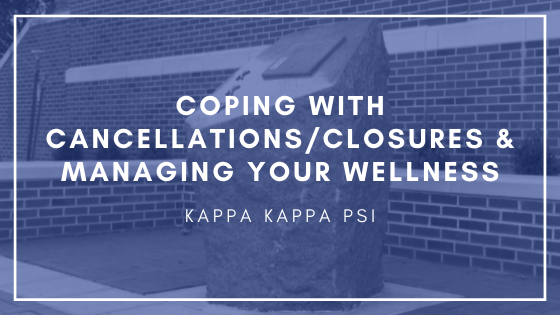Dear Brothers,
These are confusing and tough times. As we adjust to this new normal of closures and cancellations, we want to assure you that your safety and health are our top priorities. The recent changes in our organization’s programming and across campuses throughout the nation are leaving many with strong emotions. We want you to know that it is ok to feel anxious and stressed. If you have been forced to unexpectedly leave your campus and to disengage from your community, then you may be experiencing fear and anger. It is ok to feel this way. Some of our graduating seniors may be feeling disheartended because they didn’t get to attend their last convention or concert – there’s no closure. It is ok to feel this way. These are natural reactions that we are all coping with. The important thing to note is that everyone reacts differently to change and uncertainty.
As many of our Active members are transitioning to online classes, we wanted to share with you some practices that can help you cope with these changes and manage your wellness. These suggestions were collected from several articles, including the NIH, NPR, and various wellness sites.
Build a Schedule and Routine
- Going from in-person classes to all online courses can be difficult for some. You may experience restlessness and anxiety because it is different and not what your brain/body is used to. Some may be stressing out because they don’t have internet at home to even take online classes. Whatever it is that you have to do to adjust to these changes, try to build a schedule that reflects your normal routine. It may seem enticing to try to take all your classes in one sitting or to wait until later, but this could lead to burnout or further procrastination. One strategy is to time block all of your classes and set timers for each class.
Make Time to Unwind and Relax
- Without the breaks and physical movement between classes, it is important that you make time to unwind and relax. This means something different for each person. It could mean take a quick nap, taking a walk, or listening to music. Whatever it is that helps you unwind, try to make time in your daily schedule to relax. You may feel the need to take more breaks as you adjust to your new environment and that is ok. Give yourself the time to adapt and learn.
Practice Healthy Habits and Self-Care Activities
- More than likely, your environment will be different from what you are used to at college. It is important that you take the time to make a list of healthy habits and self-care activities you want to practice in your new space. Even if this is back at home or in your regular living space, being stuck inside and staring at one primary screen is difficult for most people. One important example of a healthy habit is maintaining a regular eating and sleeping schedule.
Maintain Awareness of Safety Recommendations
- Most of our student members are safe and healthy and we hope to keep it that way. It is extremely important that everyone maintain a healthy awareness of COVID-19 and preventative measures. You can visit the World Health Organization and the National Institute of Health to check out their safety recommendations. This generally includes practicing social distancing, consistent hand washing, and avoiding crowded areas. It is also important to point out that it is healthy to limit your exposure to general news coverage on COVID-19 and to double-check your sources.
Stay Connected and Engaged
- Being removed from your community is never easy to cope with. Luckily, we have access to some pretty powerful tools that you can leverage. It is important for your health to practice interconnectedness. Utilize social media, video calls, and phone calls to stay connected and engaged with one another. We are social creatures and just because events/classes are canceled doesn’t mean that our relationships should be too.
We recognize that for many college students campus is the only safe space they have. This makes life harder to adjust to when you don’t have the resources or space to take care of yourself. There are no easy solutions to these issues, but there are people out there that can help you. If you need help, please reach out to fellow Brothers and community members. At the end of the day, the most important concern for your National Council is your safety and health. We are here for you and we want to help.
If you need someone to talk to or help you get connected, please reach out to your National Vice President for Student Affairs, Bang Co. If you feel that you need to or would like to speak to a professional, there are several resources at your disposal. Here are a couple that you can try today:
Crisis Text Line – Text “HOME” to 741741 to connect with a Crisis Counselor. Crisis Text Line serves anyone, in any type of crisis, providing access to free, 24/7 support and information via a medium people already use and trust: text.
SAMHSA HOTLINE – Call 1-800-662-HELP (4357), (also known as the Treatment Referral Routing Service) or TTY: 1-800-487-4889. SAMHSA’s National Helpline is a free, confidential, 24/7, 365-day-a-year treatment referral and information service (in English and Spanish) for individuals and families facing mental and/or substance use disorders.
AEA
Bang T. Co
National Vice President for Student Affairs
(317) 370-6057
———-
Read more about Convention Cancellations.
Read more about Chapter Operations During COVID-19 Statement.

